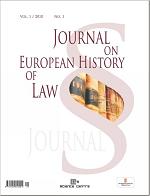A Brief History of River Navigation in Bohemia up to the 19th Century – Part 1
Author(s): Bohumil Poláček / Language(s): English
/ Issue: 2/2011
Keywords: Elbe river; waterway; navigation; water shipping duties; the sworn miller court.
According to archaeological findings in the Elbe river bed alluvium, navigation of rivers existed in the area of Bohemia already in the middle Stone Age (i.e. 6,000 to 4,000 years ago). The first written reports on the navigation along the Elbe preserved in the chronicles relate to the time when the armies of Charles the Great conquered the Elbe Serbs and Bodrces. Around the year 805, Charles the Great forbade its traders to export arms and equipment to Bohemia and the same year some of his troops were sent into the battle on the boats upstream the Elbe to Magdeburg, where they clashed with the Elbe Slavs. Duty as a fee for the use of waterways belonging to the sovereign was introduced in Bohemia according to the Magdeburg example sometime around the 60s of the 10th century. For the college of priests gathered in the church centre of the Litoměřice Castle, the Prince Spytihněv II founded the chapter with the Church of St. Stephen around the year 1057. With the founding charter, which is the oldest in our country and preserved in the original, the prince donated many of his revenues, among others the revenues from the Ústí and Litoměřice water shipping duties. With the gradual centralization of state administration and the growth of royal power it became possible to disrupt the Litoměřice trade monopoly on the Elbe, when with the decree issued by the King Přemyslid Otakar II on November 25, 1274 the town of Mělník received the right to conduct shipping on Elbe. The trade in Roudnice started to flourish from the second half of the 14th century. It was an old settlement of the Prague bishops, which was promoted to the town before the year 1279. Apart from towns, there were also several boats owned by monasteries and nobility which contributed to shipping and trade on the Elbe. In 1226 the Premonstratensian church in Doksany was given the duty-free privilege to bring one boat with salt from Serbia and one boat to export domestic products. In 1340, while he was only the Margrave, Charles IV gave the Prague reeves and councilors a privilege to choose eight sworn millers. The sworn millers eventually become the highest authority on the water in Bohemia and also oversaw the construction on rivers and their navigability, etc. In doubtful cases, they published their final opinions as “the sworn miller court”, a special arbitration tribunal, which had the responsibility of deciding water management disputes.
More...

